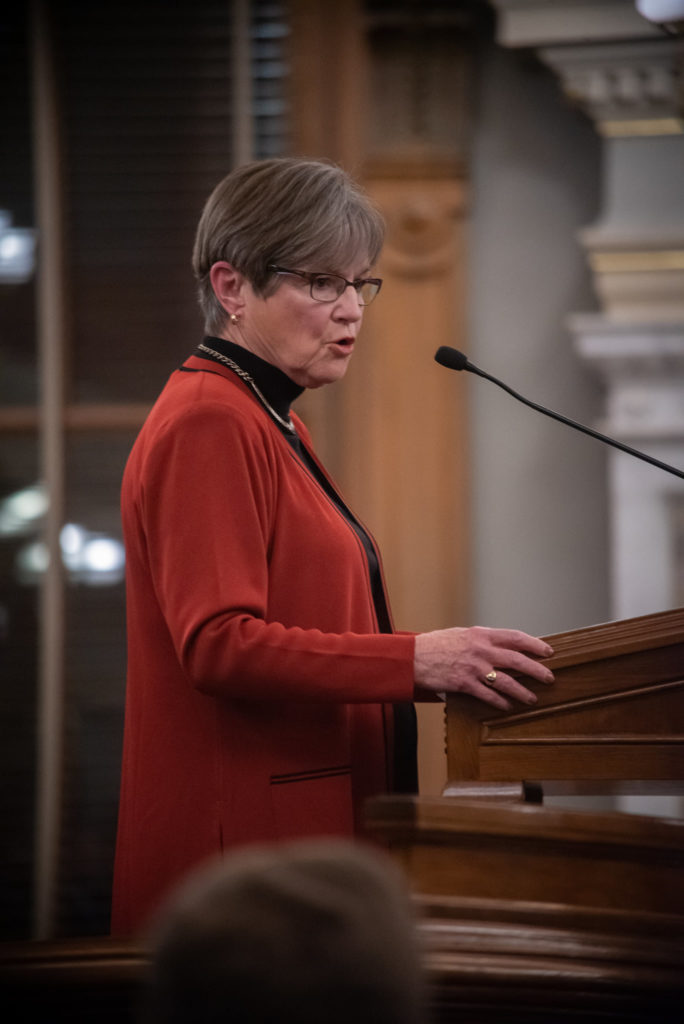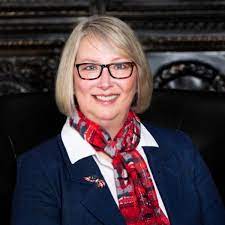Public education expected to take center stage during a session where election year politics will prevail
Topeka – The 2022 Kansas legislative session began in earnest this week, rife with election-year politics that are expected to put public education funding and curriculum proposals on center stage.
During her annual State of the State address, Kansas Gov. Laura Kelly touted her record of fully funding public schools for the fourth straight year and praised Kansas teachers for their unwavering commitment to educating our children through an historic, global pandemic.
“The full funding of our schools is something everyone in this chamber can celebrate,” Gov. Kelly told the joint session of the Kansas House and Senate. “But I also know that for these past couple of years, during the pandemic, the challenges facing our schools have gone way beyond just funding.”
“Last year, in my State of the State, I spoke directly to teachers, who nearly overnight, reinvented the way they taught, doing whatever it took to educate our children during the pandemic’s worst days,” Gov. Kelly continued. “We worked hard to get everyone back in the classroom but the job of a teacher hasn’t gotten any easier. If anything, it’s more difficult and more stressful. Teachers have always deserved our deepest gratitude, our respect, and our support. So to all the Kansas teachers out there, we thank you and we applaud you.”
In addition to upholding the promises of the Gannon school funding ruling, Gov. Kelly cited strong budget numbers to call for a freeze on college tuition increases, end the 6.5% tax on food purchases (Axe the Food Tax) as of July 1, and expand Medicaid. She also proposed every Kansan who filed taxes in 2021 get a $250 dollar tax rebate this year and $500 dollars for married couples filing jointly. She also announced a bipartisan agreement to allocate $50 million dollars in learning recovery grants for students who need that extra help to get caught up.
Some other budget proposals impacting education, social services and working Kansans put forth by Gov. Kelly include the following:
- Eliminate the practice of delaying K-12 payments by using current year funds to pay for current year expenses and reduce cash flow risk for school districts and the state. This has not been done since 2003 and is not good accounting.
- Fund the final year of agreed incremental adjustments to the base state aid school funding.
- Provide $6.76 million for additional enhancements to increase supports for educators and students.
- Restore university funding to pre-pandemic levels to help make post-secondary education more accessible to all Kansans.
- Establish the Kansas Access Partnership Grant, a need-based grant to help families with the cost of attending college.
- Add $23.5 million to career and technical education programs, including $15 million in a one-time payment distributed across the system of two-year colleges.
- Provide $253.8 million for the KPERS layering payments that were the result of skipped payments from 2017 and 2019 which will save the SGF $172 million versus the original payment schedule.
- Address the housing shortage with a $20 million investment for moderate income housing
- Improve KanCare, including the extension of Medicaid coverage for pregnant women to 12 months postpartum
- Increasing pay for all state employees by 5%.
Given the depth of this budget, there is no questioning the priorities of Gov. Kelly. It is a smart and structurally balanced budget that addresses the needs of all Kansans, and it is the direct result of stable leadership and sound fiscal management. We are finally at a turning point where the state budget is really starting to work for Kansas.
Senate and House Education committees get to work
Sen. Molly Baumgardner, R-Louisberg, and Rep. Kristey Williams, R-Augusta, chairs of the Senate Education and House K-12 Education Budget committees, respectively, conducted their first meetings of the 2022 session this week with updates from Office of the Revisor and Kansas State Department of Education staff giving updates on budget, enrollment trends, and ESSER funding, to name a few. The K-12 Education Committee also heard a presentation on Article 6 of the Kansas Constitution that outlines the responsibilities of the Kansas State Board of Education, the Kansas Board of Regents, and the Kansas Education Commissioner.
Rep. Karen Humphries, R-Wichita, chair of the House Higher Education Budget Committee, also held her first meeting of the session to have members briefed on the budget processes of the state’s regents universities. The Senate Education committee heard a presentation from Blake Flanders, president and CEO of the Kansas Board of Regents, who briefed members on the enrollment trends at the regents schools. No specific bills were introduced in any of the education committees this week.
Kansas State Board of Education Members Approve Temporary Emergency Authorized License (TEAL) to Address Substitute Teacher Shortage
During their regular January business meeting this week, members of the Kansas State Board of Education unanimously approved the Temporary Emergency Authorized License, or TEAL, to allow adults, 18 years of age or older, to work as substitute teachers.
This emergency declaration was made to alleviate the workload for schools that have become chronically short-staffed because of the COVID-19 pandemic. Anyone wishing to work as a substitute who doesn’t have the required 60 hours of college credit must be fingerprinted and submit to a KBI background check, have a high school diploma (those with only a GED aren’t eligible), have a verified employment commitment from a school district or system and submit a completed application to the Kansas State Department of Education.
This TEAL will expire on June 1, 2022, and more stringent requirements to be a substitute teacher will go back into effect.
“We support the TEAL program because we have to in order to keep schools open, to ensure funding remains stable, and to shield professional educators from negative impacts that threaten their health, well-being, and financial stability, ” said Sherri Schwanz, KNEA president. “But, let’s not mince words. Our anger should not be directed at the response we’ve been forced to accept, but instead at the elected officials who put our educators and students into this position by enacting laws limiting local control over the response to a global pandemic.”
View the full statement HERE.





